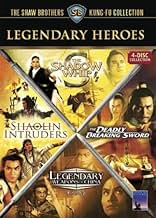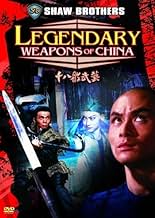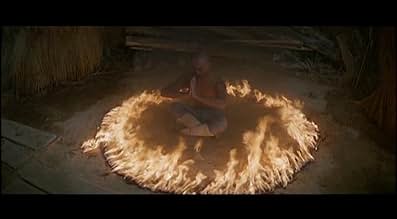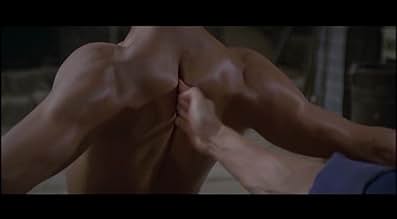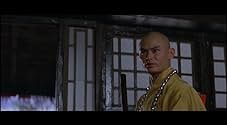IMDb RATING
6.8/10
2K
YOUR RATING
A band of killers from an ailing kung fu and magic society are sent on a manhunt for a former member of the society, whose bad mouthing threatens its existence.A band of killers from an ailing kung fu and magic society are sent on a manhunt for a former member of the society, whose bad mouthing threatens its existence.A band of killers from an ailing kung fu and magic society are sent on a manhunt for a former member of the society, whose bad mouthing threatens its existence.
- Director
- Writers
- Stars
- Awards
- 1 nomination total
Liu Chia-Yung
- Lei Ying
- (as Chia-Yung Liu)
Kara Ying Hung Wai
- Fang Shao-Ching
- (as Kara Hui)
- Director
- Writers
- All cast & crew
- Production, box office & more at IMDbPro
Featured reviews
'Legendary Weapons Of China (1982)' is a little bit confusing at first, with a variety of gang factions all searching for a supposed traitor without actually knowing what he looks like. Because we also don't know who he is, it can be a bit difficult to discern who's who and who's lying about who they really are. It doesn't help that the true intentions of the various searchers aren't made clear until later on in the picture. After a while, though, everything sort of coalesces when the flick gives us some much-needed exposition as to what it's actually about. From then on, it's much easier to follow. Besides, the story itself isn't the main reason that anyone's watching this. That would be the immense fight sequences, of course, and none of them disappoint. The flick puts a lot of focus on three types of supernatural martial arts: magic, spiritual boxing and Maoshan. The first allows the user to conjure up a variety of secret weapons, teleport in balls of smoke and create decoys of themselves at a moment's notice; at its highest levels, it can be used to command others to do one's bidding. The second allows the user to withstand blows from bladed weaponry without so much as a scratch. The third makes use of voodoo-esque techniques to control other people, binding them to dolls which can be manipulated with twisting motions and pressure point manipulations. It's these three techniques that really marks the picture as something distinct from a lot of its peers, and it allows for some distinct choreography that constantly keeps the audience as on their toes as those involved in the battles themselves. Furthermore, the flick makes use of some confined spaces that necessitate further invention in terms of designing the bouts that take place within them. It's really fun to see people fighting in a cramped attic or tight alleyway, making use of their environment to avoid attacks both physical and otherworldly. It's a nice change from the genre's tendency to have its bouts take place in wide open arenas. Having said that, there are plenty of action scenes that take place in said spaces. They aren't any worse off for this, even if they are more traditional, mostly because their choreography is consistently phenomenal and their formal execution is consistently accomplished. That's what you'd expect from director Chia-Liang Liu, of course, but he cements his position as one of the greatest action directors of all time with each new film of his I see. Plus, he gets to really shine in front of the camera this time. Although he has cameos in a lot of his films, he's arguably the protagonist of this one and a lot of the set-pieces are focused almost entirely on him. The final duel is jaw-droppingly good, an intense one-on-one that makes use of 13 of the 18 eponymous legendary weapons (5 are used in an earlier sequence) and is reinvigorated each time the characters adopt a new fighting tool. It's fast-paced, exciting and unbelievably impressive. The same can be said of another stand-out set-piece, a hand-to-hand bout that features Gordon Liu in a rare villainous role and features some choreography I've never seen before (Liu makes use of his shoulder blades to fight facing backwards!). The third notable conflict occurs just after a hugely entertaining sequence of a charlatan conspiring with his gang to convince an entire town he's a famous Kung fu fighter, which sees the same conman unwittingly take on an opponent while he's under the influence of Maoshan folk magic. It's a genuinely funny scene that makes excellent use of slapstick comedy in combination with impressive athleticism, with Alexander Fu Sheng being tossed around like a ragdoll so convincingly you forget it's actually him doing all the flipping. The humour is present in a number of other scenes, too, which keeps things feeling suitably lighthearted even when people are fighting for their lives. Ultimately, although the plot is a little confusing to start with (and takes a while to properly get going), movie is a ton of fun when it's fully underway. The experience is a bit uneven, but - more often than not - it fires on all cylinders and its Kung fu is absolutely spectacular. It's a blast.
10bickeler
Anyone who has reviewed this movie and stated the plot is stupid has no knowledge of 19th century China. In fact during the Boxer Rebellion these "Boxers" believed through rituals they could make themselves impervious to firearms. No I am not making this up and neither did Chia-Liang Liu and while he exaggerated and had fun with it for comedic values he was making an historical notation. The Martial Arts in this movie are exceptional and so is the outrageous humor instilled in this movie. Not only did he poke fun at the Boxers but also many of the Martial Arts movies of the 1970s that went a little overboard with the magical Kung Fu element. And all in the same breath showed the usage of almost every weapon used in Chinese Martial Arts. The talent in this movie speaks for itself aside from Liu and his brothers there is Fu Sheng, Hou Hsiao and the sweet Kara Hui. They don't make Martial Arts movies this original or good anymore either with all the Ip Man clones and CGI epics not even close. All I can say is Chia-Liang Liu you are sorely missed.... And the point is no amount of skill will help you dodge a bullet!
10winner55
This is a brilliantly constructed film. I suppose those who remark it having a 'poor plot' long for something more simple, more direct, more traditionally 'Shaw Bros.' To be sure, the plot is intended to provide support for the interlaced themes, but it is complex and meaty on its own terms.
However the themes are indeed the heart of the film. The comic scene of the fake kung fu battle is clearly intended as a parody of the traditional swordplay film, down to the hand-squeezed blood-squib. The use of magic kung fu is, less clearly because more subtly, intended to debunk the myth of such magic, reducing it to a kind of martial-arts parlor trick - magnificently staged, but of course ineffective against anything other than itself. The real martial arts are at last presented with considerable credibility in the final third of the film, but is intended to remind us that, as powerful as it could be, the martial arts cannot compete with modern weaponry. Along the way, we also deal with problems of family loyalty, national loyalty (vs. phony 'patriotism'), and the nature of the spirituality necessary to master the martial arts, which requires an open mind and compassion rather than blind dedication.
What director Liu is reaching for is nothing less than a complete debunking of all the nonsense that had wrapped itself around the study of the martial arts in the 19th century and which was resurrected in the wake of the kung fu film phenomenon of the 1970s. Liu is asking us to respect, even admire, the martial arts, perhaps to learn them - but on their own terms, without all the myths that obscure their real essence.
This makes for a highly sophisticated script, which Liu carefully keeps popularized not only through the use of humor but, more importantly, by tight compression of story and editing. Blink and you will surely miss an important event.
As for the staging and camera-work some have remarked - technically, this film is pure classic Shaw Bros.
And as for the martial arts in the final battle - absolutely magnificent.
Unique in its genre and a real treat.
However the themes are indeed the heart of the film. The comic scene of the fake kung fu battle is clearly intended as a parody of the traditional swordplay film, down to the hand-squeezed blood-squib. The use of magic kung fu is, less clearly because more subtly, intended to debunk the myth of such magic, reducing it to a kind of martial-arts parlor trick - magnificently staged, but of course ineffective against anything other than itself. The real martial arts are at last presented with considerable credibility in the final third of the film, but is intended to remind us that, as powerful as it could be, the martial arts cannot compete with modern weaponry. Along the way, we also deal with problems of family loyalty, national loyalty (vs. phony 'patriotism'), and the nature of the spirituality necessary to master the martial arts, which requires an open mind and compassion rather than blind dedication.
What director Liu is reaching for is nothing less than a complete debunking of all the nonsense that had wrapped itself around the study of the martial arts in the 19th century and which was resurrected in the wake of the kung fu film phenomenon of the 1970s. Liu is asking us to respect, even admire, the martial arts, perhaps to learn them - but on their own terms, without all the myths that obscure their real essence.
This makes for a highly sophisticated script, which Liu carefully keeps popularized not only through the use of humor but, more importantly, by tight compression of story and editing. Blink and you will surely miss an important event.
As for the staging and camera-work some have remarked - technically, this film is pure classic Shaw Bros.
And as for the martial arts in the final battle - absolutely magnificent.
Unique in its genre and a real treat.
The last reviewer of this film missed the point. This film is excellent and the last 30 minutes contains some of the best martial arts action committed to film. Yes, the plot is ridiculous and the dubbing makes everyone sound like a porn star but you don't watch kung fu films for the acting skill and production values. You watch them for escapism and entertainment.
The story itself is about the rise of the gun in china and the director, who also stars, attempting to show how pointless it was to fight the evil of the gun.
Lei Kung is a martial arts master whose speciality is 'pugilism'(i suppose it was easier to dub that word than what the real skill is called), which is basically invulnerability to conventional weapons (swords, knives, blades etc). He decided to dissolve his sect within the school he taught in to protect his students. He was forced to do this as his superiors were ordering other sect to practice 'pugilism' with the proviso of ultimately being able to withstand bullets.
So now it is several years later, Lei Kung is hiding out as a woodcutter, and the bad guys send some martial arts experts to seek him out and kill him. At first we know of three: Ti Hau, the best student of a master who teaches partial invulnerability and techniques to confuse the enemy. Chao Ching, who is a woman, but who dresses as a man to mingle with the populace. She can see how attempting to overcome the gun with 'pugilism' is pointless and wants to join Lei Kung. Finally there is Ti Tan, another master 'pugilist'.
While they are searching another man whose name is not revealed is searching for Lei Kung. His skill seems to be based on hypnotism, and dolls. He hypnotises a person, then uses a doll to control their movements, thus having someone fight for him.
Ti Hau ends up getting ill whilst searching, but is saved be Lei Kung who nurses him back to help with Chau Ching's help. She convinces Lei Kung that she wants to help, but doubts if they can convince Ti Hau when he gets better. It does not matter ultimately, because the other mysterious fighter tracks Lei Kung down. They fight, but Lei kung is well out of practice and is defeated easily. But the mysterious bad guy is Lei Kung's brother, Lei Yung who explains that he was also given the order to kill but can't kill his own brother. He suggests that Lei Kung begins to proactive again to recover his strength and power. That way he can defend himself against other killers who are after him.
Hi trains hard, and starts to get his power back. But Ti Tan turns up and starts to kick off. Ti Hau tries to explain that Lei Kung is a woodcutter who only knows basic kung fu taught to him by Chau Ching. Ti Tan is not convinced and begins his attack. Chau ching defends but is no match, neither is Ti Hau. So it is time for Lei Kung o flex hi muscles. He fights and in doing so speeds up his strength recovery. He defeats Ti Tan, but in doing so let's it slip that he really is Lei kung. Ti Hau runs off, not knowing what to do, he has witnessed Lei Kungs far superior martial skill and is unsure of how to proceed. Ti Hau returns that night, using his skills he tries to convince Lei Kung and Chau Ching that he has gathered many men, but they are dummies and Lei Kung sees through the deception. But it is not Ti Hau but his master who is attacking. Another great fight scene follows with Ti Hau turning up half way through and his own teacher turning on him when he realises he cannot kill Lei Kung. In trying to kill his student, he shows Ti Hau that there is more to life than killing and his own life is worth something. This is the reason Lei Kung disbanded his school, to protect his students who he knew would die if they tried to withstand the gun. Lei Kung defeats Ti Haus' master who then tries to kill himself. Ti Hau stops him, and his teacher also sees that perhaps his way of life is wrong, and his pupil's lives are not expendable. He leaves suggesting Ti Hau remain to carry on training and learning with Lei Kung and Chau Ching. Lei Kung walks off and dusts off his 'holy robes' explaining that he has to go to the city temple to see his brother. He explains that his brother is not really going to let him walk away, but wanted him to train up and face him in a duel to the death. He takes his 2 new students with him, and then fights his brother using weapons combat in some of the most amazing choreography i have seen in a kung fu film. He defeats his brother who he then tells to go back and report that he killed him. His brother is left broken, finally realising that personal glory is no substitute for having a rich and meaningful life.
The story itself is about the rise of the gun in china and the director, who also stars, attempting to show how pointless it was to fight the evil of the gun.
Lei Kung is a martial arts master whose speciality is 'pugilism'(i suppose it was easier to dub that word than what the real skill is called), which is basically invulnerability to conventional weapons (swords, knives, blades etc). He decided to dissolve his sect within the school he taught in to protect his students. He was forced to do this as his superiors were ordering other sect to practice 'pugilism' with the proviso of ultimately being able to withstand bullets.
So now it is several years later, Lei Kung is hiding out as a woodcutter, and the bad guys send some martial arts experts to seek him out and kill him. At first we know of three: Ti Hau, the best student of a master who teaches partial invulnerability and techniques to confuse the enemy. Chao Ching, who is a woman, but who dresses as a man to mingle with the populace. She can see how attempting to overcome the gun with 'pugilism' is pointless and wants to join Lei Kung. Finally there is Ti Tan, another master 'pugilist'.
While they are searching another man whose name is not revealed is searching for Lei Kung. His skill seems to be based on hypnotism, and dolls. He hypnotises a person, then uses a doll to control their movements, thus having someone fight for him.
Ti Hau ends up getting ill whilst searching, but is saved be Lei Kung who nurses him back to help with Chau Ching's help. She convinces Lei Kung that she wants to help, but doubts if they can convince Ti Hau when he gets better. It does not matter ultimately, because the other mysterious fighter tracks Lei Kung down. They fight, but Lei kung is well out of practice and is defeated easily. But the mysterious bad guy is Lei Kung's brother, Lei Yung who explains that he was also given the order to kill but can't kill his own brother. He suggests that Lei Kung begins to proactive again to recover his strength and power. That way he can defend himself against other killers who are after him.
Hi trains hard, and starts to get his power back. But Ti Tan turns up and starts to kick off. Ti Hau tries to explain that Lei Kung is a woodcutter who only knows basic kung fu taught to him by Chau Ching. Ti Tan is not convinced and begins his attack. Chau ching defends but is no match, neither is Ti Hau. So it is time for Lei Kung o flex hi muscles. He fights and in doing so speeds up his strength recovery. He defeats Ti Tan, but in doing so let's it slip that he really is Lei kung. Ti Hau runs off, not knowing what to do, he has witnessed Lei Kungs far superior martial skill and is unsure of how to proceed. Ti Hau returns that night, using his skills he tries to convince Lei Kung and Chau Ching that he has gathered many men, but they are dummies and Lei Kung sees through the deception. But it is not Ti Hau but his master who is attacking. Another great fight scene follows with Ti Hau turning up half way through and his own teacher turning on him when he realises he cannot kill Lei Kung. In trying to kill his student, he shows Ti Hau that there is more to life than killing and his own life is worth something. This is the reason Lei Kung disbanded his school, to protect his students who he knew would die if they tried to withstand the gun. Lei Kung defeats Ti Haus' master who then tries to kill himself. Ti Hau stops him, and his teacher also sees that perhaps his way of life is wrong, and his pupil's lives are not expendable. He leaves suggesting Ti Hau remain to carry on training and learning with Lei Kung and Chau Ching. Lei Kung walks off and dusts off his 'holy robes' explaining that he has to go to the city temple to see his brother. He explains that his brother is not really going to let him walk away, but wanted him to train up and face him in a duel to the death. He takes his 2 new students with him, and then fights his brother using weapons combat in some of the most amazing choreography i have seen in a kung fu film. He defeats his brother who he then tells to go back and report that he killed him. His brother is left broken, finally realising that personal glory is no substitute for having a rich and meaningful life.
This movie has one of the best introductions of any film I have ever seen. The introduction shows a woman demonstrating several weapons of Kung Fu while sinister music plays. By demonstrating, I mean killing several men with these deadly weapons of Kung Fu! This movie has great style and creativity throughout. The story line is actually good, but might take several viewings to really understand what is going on.
Like others have said, it is not really a serious martial arts film, but it is one of my favorites nonetheless. You cannot beat the sinister music/introduction sequence in the beginning of the movie. That is worth watching alone. If you are a fan of Chinese Super Ninja, you will also like this movie.
Like others have said, it is not really a serious martial arts film, but it is one of my favorites nonetheless. You cannot beat the sinister music/introduction sequence in the beginning of the movie. That is worth watching alone. If you are a fan of Chinese Super Ninja, you will also like this movie.
Did you know
- TriviaChia-Liang Liu: [martial arts demonstration] Opening credits show a demonstration of martial arts against an empty backdrop.
- Alternate versionsThe 1987 UK video suffered extensive cuts of over 5 minutes and lost all footage of Japanese throwing stars and nunchaku used in the fight scenes.
- ConnectionsFeatured in Les hommes de main (2001)
- How long is Legendary Weapons of China?Powered by Alexa
Details
- Release date
- Country of origin
- Languages
- Also known as
- Legendary Weapons of China
- Production company
- See more company credits at IMDbPro
- Runtime1 hour 49 minutes
- Sound mix
- Aspect ratio
- 2.35 : 1
Contribute to this page
Suggest an edit or add missing content

Top Gap
By what name was Les 18 armes légendaires du Kung Fu (1982) officially released in India in English?
Answer


